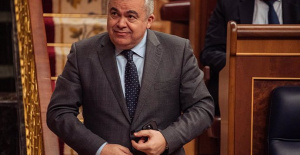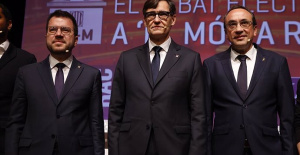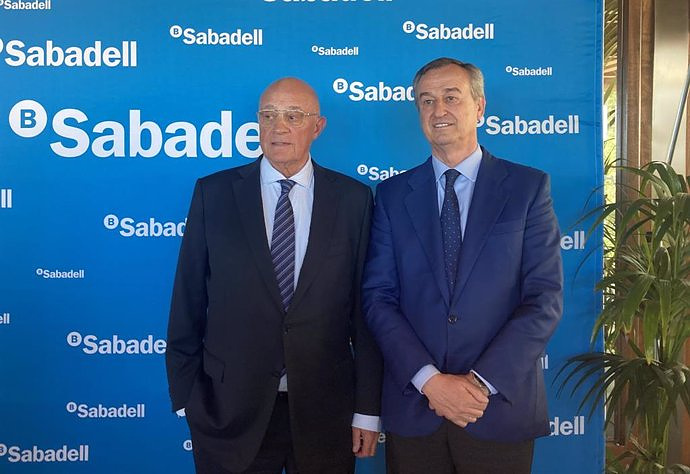He defends that the new anti-fragmentation instrument will allow rates to be raised "as much as necessary"
MADRID, 28 Jun. (EUROPA PRESS) -
The president of the European Central Bank (ECB), Christine Lagarde, assured this Tuesday that the institution is willing to go "as far as necessary" to guarantee that inflation stabilizes in the medium term at the 2% objective and has defended that having a specific tool to combat fragmentation will allow the entity to increase interest rates "as much as necessary".
The Frenchwoman confirmed in her opening speech at the 2022 edition of the central bank forum organized by the ECB in Sintra (Portugal) that the Council and Government will raise rates by 25 basis points in July and will raise them again in September, although then the intensity of the rate increase will depend on the evolution of inflation expectations.
"We will continue on this path of normalization, and we will go as far as necessary to guarantee that inflation stabilizes at our 2% medium-term objective," assured the central banker of the euro zone, which from 2023 will have Croatia as a new member.
In her analysis, Lagarde has acknowledged that inflationary pressures are intensifying and widening, not only reflecting high import prices, as they begin to take hold in the services sector, while low unemployment and labor shortages Along with the recovery, they suggest a rebound in wages of more than 4%, according to the latest forecasts for 2022 and 2023, and 3.7% in 2024, almost double the historical average before the pandemic.
Likewise, Lagarde has warned that there are signs that the supply shocks affecting the economy could last longer and, although it is reasonable to assume that the interruptions in the global supply chain will be resolved gradually, the outlook for energy and raw materials premiums are still "cloudy".
In this way, for the president of the ECB, the optionality assumed in the institution's actions guarantees that monetary policy can react with agility to the incoming data on the economy and inflation expectations and, if uncertainty decreases, re-optimize the policy trajectory as needed.
"This conditional approach to the rate of adjustment of interest rates should not be confused with the delay in normalisation", stressed the Frenchwoman, for whom, given that the ECB's position is based on a clear reaction function, the expectations of interest rates and risk-free rates can be adjusted in advance.
Indeed, Lagarde has warned that there are conditions in which gradualism would not be appropriate, such as where higher inflation threatens to unpin inflation expectations, or there are signs of a more permanent loss of economic potential that limits the availability of resources, which would force the ECB to withdraw its monetary accommodation more quickly.
In this regard, the President of the ECB has reiterated the importance of monetary policy being properly transmitted between the different jurisdictions of the eurozone, for which the central bank, in addition to managing the reinvestment of maturities, has ordered to speed up the design of a new specific instrument to combat fragmentation in the markets of the euro zone.
"The new instrument will have to be effective, as well as proportionate and contain sufficient guarantees to preserve the momentum of the Member States towards a sound fiscal policy," Lagarde pointed out.
In this sense, the French has defended that preserving the transmission of the policy throughout the euro zone will allow rates to "increase as much as necessary".

 Exploring Cardano: Inner Workings and Advantages of this Cryptocurrency
Exploring Cardano: Inner Workings and Advantages of this Cryptocurrency Seville.- Economy.- Innova.- STSA inaugurates its new painting and sealing hangar in San Pablo, for 18 million
Seville.- Economy.- Innova.- STSA inaugurates its new painting and sealing hangar in San Pablo, for 18 million Innova.- More than 300 volunteers join the Andalucía Compromiso Digital network in one month to facilitate access to ICT
Innova.- More than 300 volunteers join the Andalucía Compromiso Digital network in one month to facilitate access to ICT Innova.-AMP.- Ayesa acquires 51% of Sadiel, which will create new technological engineering products and expand markets
Innova.-AMP.- Ayesa acquires 51% of Sadiel, which will create new technological engineering products and expand markets Cerdán censures the "dirty war" of the right and calls for a debate around "democratic regeneration"
Cerdán censures the "dirty war" of the right and calls for a debate around "democratic regeneration" 12M.- Abascal (Vox) proposes "massive deportations" in the face of illegal immigration
12M.- Abascal (Vox) proposes "massive deportations" in the face of illegal immigration The campaign reaches the halfway mark marked by Sánchez's reflection and with Illa first in polls
The campaign reaches the halfway mark marked by Sánchez's reflection and with Illa first in polls Iran sends 'Shahid Mahdawi' beyond the equator in first long-distance mission by a warship
Iran sends 'Shahid Mahdawi' beyond the equator in first long-distance mission by a warship How Blockchain in being used to shape the future
How Blockchain in being used to shape the future Not just BTC and ETH: Here Are Some More Interesting Coins Worth Focusing on
Not just BTC and ETH: Here Are Some More Interesting Coins Worth Focusing on A sensor system obtains the fingerprint of essential oils and detects if they have been adulterated
A sensor system obtains the fingerprint of essential oils and detects if they have been adulterated Faraday UPV presents the 'Origin' rocket to exceed 10 km of flight: "It is the beginning of the journey to space"
Faraday UPV presents the 'Origin' rocket to exceed 10 km of flight: "It is the beginning of the journey to space" The Generalitat calls for aid worth 4 million to promote innovation projects in municipalities
The Generalitat calls for aid worth 4 million to promote innovation projects in municipalities UPV students design an app that helps improve the ventilation of homes in the face of high temperatures
UPV students design an app that helps improve the ventilation of homes in the face of high temperatures A million people demonstrate in France against Macron's pension reform
A million people demonstrate in France against Macron's pension reform Russia launches several missiles against "critical infrastructure" in the city of Zaporizhia
Russia launches several missiles against "critical infrastructure" in the city of Zaporizhia A "procession" remembers the dead of the Calabria shipwreck as bodies continue to wash up on the shore
A "procession" remembers the dead of the Calabria shipwreck as bodies continue to wash up on the shore Prison sentences handed down for three prominent Hong Kong pro-democracy activists
Prison sentences handed down for three prominent Hong Kong pro-democracy activists ETH continues to leave trading platforms, Ethereum balance on exchanges lowest in 3 years
ETH continues to leave trading platforms, Ethereum balance on exchanges lowest in 3 years Investors invest $450 million in Consensys, Ethereum incubator now valued at $7 billion
Investors invest $450 million in Consensys, Ethereum incubator now valued at $7 billion Alchemy Integrates Ethereum L2 Product Starknet to Enhance Web3 Scalability at a Price 100x Lower Than L1 Fees
Alchemy Integrates Ethereum L2 Product Starknet to Enhance Web3 Scalability at a Price 100x Lower Than L1 Fees Mining Report: Bitcoin's Electricity Consumption Declines by 25% in Q1 2022
Mining Report: Bitcoin's Electricity Consumption Declines by 25% in Q1 2022 Oil-to-Bitcoin Mining Firm Crusoe Energy Systems Raised $505 Million
Oil-to-Bitcoin Mining Firm Crusoe Energy Systems Raised $505 Million Microbt reveals the latest Bitcoin mining rigs -- Machines produce up to 126 TH/s with custom 5nm chip design
Microbt reveals the latest Bitcoin mining rigs -- Machines produce up to 126 TH/s with custom 5nm chip design Bitcoin's Mining Difficulty Hits a Lifetime High, With More Than 90% of BTC Supply Issued
Bitcoin's Mining Difficulty Hits a Lifetime High, With More Than 90% of BTC Supply Issued The Biggest Movers are Near, EOS, and RUNE during Friday's Selloff
The Biggest Movers are Near, EOS, and RUNE during Friday's Selloff Global Markets Spooked by a Hawkish Fed and Covid, Stocks and Crypto Gain After Musk Buys Twitter
Global Markets Spooked by a Hawkish Fed and Covid, Stocks and Crypto Gain After Musk Buys Twitter Bitso to offset carbon emissions from the Trading Platform's ERC20, ETH, and BTC Transactions
Bitso to offset carbon emissions from the Trading Platform's ERC20, ETH, and BTC Transactions Draftkings Announces 2022 College Hoops NFT Selection for March Madness
Draftkings Announces 2022 College Hoops NFT Selection for March Madness



























